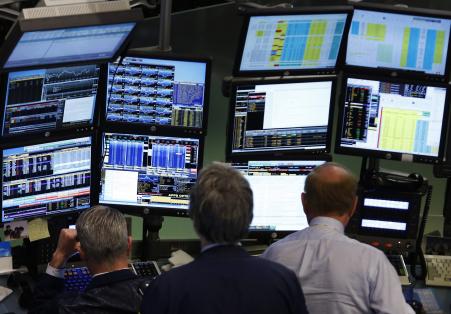By Owen Davis -

U.S. financial regulators will soon announce rules that could transform the $700 trillion swaps market. The change would likely force major Wall Street banks, currently dominant in the swaps trade, to cede business to independent dealers, hedge funds and high-frequency traders.
As the Wall Street Journal reports, the policy would guarantee anonymity for participants in swaps trades, making swaps more similar to financial products that trade on exchanges, such as futures and equities. That could mean loss of revenue for the Wall Street banks now at the center of the swaps market. The Commodity Futures Trading Commission plans to announce the rules in as little as a month.
A majority of swaps trades currently run through just five banks, which match sellers and buyers and take a cut of each deal. The so-called “over-the-counter” arrangement has been criticized because it allows firms like Goldman Sachs and Barclays to amass valuable information on its clients while quietly negotiating its own advantageous prices.
Swaps are bilateral trades that allow parties to hedge risks or speculate on a whole universe of market events, from interest rate fluctuations to the cost of shipping crude through the Baltic Sea. The most common type is an interest-rate swap, which allows firms with fixed-rate bonds to swap for floating rates, or vice versa.
Another variation, the credit-default swap, gained notoriety in the fallout of the financial crisis, when it was revealed that banks had underwritten enormous bets on whether bundles mortgages would default. The sheer volume of outstanding credit-default swaps couldn’t be sustained when the housing market nosedived.
Counterintuitively, the CFTC hopes that ensuring anonymity between swaps buyers will increase overall transparency in the market. Dodd-Frank mandated the establishment of special clearinghouses to backstop potentially risky swaps. Alongside these clearinghouses, the CFTC encouraged the use of newly established venues that allow participants to bypass the banker-dealers and trade directly with each other.
So far, however, the swaps business has kept mainly to the dim backrooms of a handful of major banks. Ensured anonymity would hasten the flight of swaps buyers to the new, more open marketplaces, which match buy and sell orders without the need for middlemen.
The proposed policy isn’t without its critics, though. The only Republican CFTC commissioner, J. Christopher Giancarlo, recently released a white paper detailing drawbacks to the commission’s approach to swaps, arguing that the new rules would increase systemic risk and “add unprecedented regulatory complexity without meaningful benefit.”
Giancarlo points out, moving swaps onto these new open venues would be a boon to high-frequency algorithmic traders, which until now have found little purchase in the swaps market. In a speech last month, Giancarlo said, “It is unclear how those who support the CFTC’s impetus for [open swap marketplaces], yet decry [high-frequency trading] in today’s equities and futures markets, will reconcile these views.”
